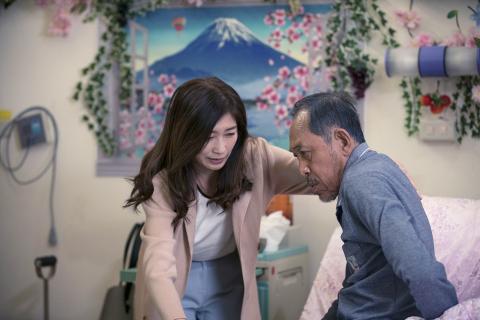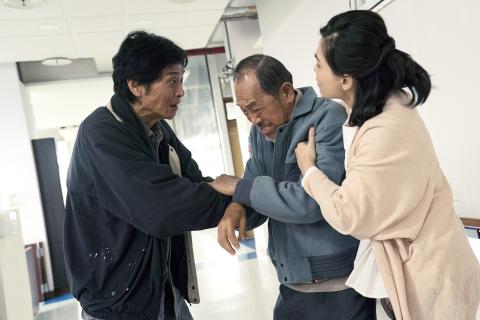Dad’s Suit (老大人), which opened last Friday, is a rumination on old age and the toll it takes on all concerned: from the elderly coping with once productive, now ailing bodies; to their children-turned-caregivers, sandwiched between the needs of older and younger dependents; to their even younger grandchildren grappling with nascent futures and responsibilities.
Chin Mao (金茂), portrayed by Hsiao Hu-tou (小戽斗), is an elderly man living alone in the gentle hills of Pingsi (平溪) in New Taipei City. A widower, the peace Chin finds in his long-time neighbors, familiar surroundings and daily routines is interrupted early in the movie by a suicide in his community. Chin himself is soon plagued by a stomach ailment that sends him to the hospital.
As the firstborn male, Chin’s son, played by Jason King (喜翔), is expected to bear responsibility for his father’s care. He almost buckles under the pressure, scrambling as he is to make ends meet between his bare-bones painting business, cramped apartment and surly wife.

Photo courtesy of Vie Vision Pictures
Chin’s daughter, played by Phoebe Huang (黃嘉千) in a Golden Horse-nominated role, is a more willing and able caretaker. But Chin refuses to let her take care of him, for reasons that are never made clear — King’s character mentions that his sister has married out of the family, yet it could just as well be about Chin’s struggle to maintain the dignity of his enfeebled male body.
The conflicts between the independence that Chin craves, the care that his body demands and the constraints faced by his children drive the gears of the movie toward its inexorable ending.
Dad’s Suit is the feature film debut by director Hung Po-hao (洪伯豪), previously best-known for co-directing medical drama series Wake Up 2 (麻醉風暴2). In his hands, the heavy subject of aging — rarely placed front and center in any form of entertainment — is successfully brought into the fold of popular film. What he lacks in formal innovation and complexity, Hung makes up for by coaxing heartfelt and naturalistic performances from his actors.

Photo courtesy of Vie Vision Pictures
Hsiao has the most challenging role as the emotional center of the film, portraying a caustic grandfather while still inspiring love and empathy. Glimpses of his vulnerability help to strike this delicate balance. Chin’s late wife was fond of the fragrant banana shrub flower, the mere sight or whiff of which stirs something deep within him, alluding to the great love they shared and the profound absence her death has left. Chin also reserves a rare affection for his grandson, played by Yen Tsao (曹晏豪).
The Chinese name of the banana shrub flower (含笑花, literally “hidden smile flower”) confirms a family trait — that they are not in the habit of communicating emotions. To that effect, Hung overuses the gimmick of family members weeping or conducting hard-hitting conversations just out of sight and earshot (or so it seems) of each other.
King and Huang turn in convincing performances as siblings who work through mutual resentment to a better understanding of each other’s predicaments. King rounds off his character’s sharp edge with a tenderness that makes him relatable. But Huang has more dramatic tension to sink her teeth into, from dismissive patriarchal attitudes about a daughter’s value to her family, to denial about her failing marriage.
Unfortunately, these performances are the highlight of a film that never quite takes off, weighed down by the inscrutable intentions of its characters, especially the mercurial Chin. Aside from a throwaway line that he used to live a hard life as a miner and self-medicated by drinking and gambling, the movie does not explain why intergenerational relations are as fraught as they are. Chin’s vacillation on institutionalized care is also perplexing.
The movie’s Chinese title translates to “old sir,” but the English title draws attention to a Western suit that serves as a motif revealing Chin’s various states of mind. There is in fact more than one suit. The first is a musty relic stored away in Chin’s closet, which he wears to pose for a funeral portrait. Another is a dapper new suit and bowtie made for a wedding, a celebration of young love and new life. Yet another is Chin’s grandson’s business suit, an example of youthful progress and upward mobility.
Like the suit and its pat symbolism, the movie tries hard to capture the complex realities surrounding aging, but never reaches beyond the predictable. Hung’s foreshadowing is heavy-handed, and without spoiling the plot, the sentimental script ultimately meanders down a path too well-trodden to give the viewer any new insight into aging. As inevitable as old age and death may be, the getting-there should never feel this predictable.

On April 26, The Lancet published a letter from two doctors at Taichung-based China Medical University Hospital (CMUH) warning that “Taiwan’s Health Care System is on the Brink of Collapse.” The authors said that “Years of policy inaction and mismanagement of resources have led to the National Health Insurance system operating under unsustainable conditions.” The pushback was immediate. Errors in the paper were quickly identified and publicized, to discredit the authors (the hospital apologized). CNA reported that CMUH said the letter described Taiwan in 2021 as having 62 nurses per 10,000 people, when the correct number was 78 nurses per 10,000

As we live longer, our risk of cognitive impairment is increasing. How can we delay the onset of symptoms? Do we have to give up every indulgence or can small changes make a difference? We asked neurologists for tips on how to keep our brains healthy for life. TAKE CARE OF YOUR HEALTH “All of the sensible things that apply to bodily health apply to brain health,” says Suzanne O’Sullivan, a consultant in neurology at the National Hospital for Neurology and Neurosurgery in London, and the author of The Age of Diagnosis. “When you’re 20, you can get away with absolute

May 5 to May 11 What started out as friction between Taiwanese students at Taichung First High School and a Japanese head cook escalated dramatically over the first two weeks of May 1927. It began on April 30 when the cook’s wife knew that lotus starch used in that night’s dinner had rat feces in it, but failed to inform staff until the meal was already prepared. The students believed that her silence was intentional, and filed a complaint. The school’s Japanese administrators sided with the cook’s family, dismissing the students as troublemakers and clamping down on their freedoms — with

As Donald Trump’s executive order in March led to the shuttering of Voice of America (VOA) — the global broadcaster whose roots date back to the fight against Nazi propaganda — he quickly attracted support from figures not used to aligning themselves with any US administration. Trump had ordered the US Agency for Global Media, the federal agency that funds VOA and other groups promoting independent journalism overseas, to be “eliminated to the maximum extent consistent with applicable law.” The decision suddenly halted programming in 49 languages to more than 425 million people. In Moscow, Margarita Simonyan, the hardline editor-in-chief of the